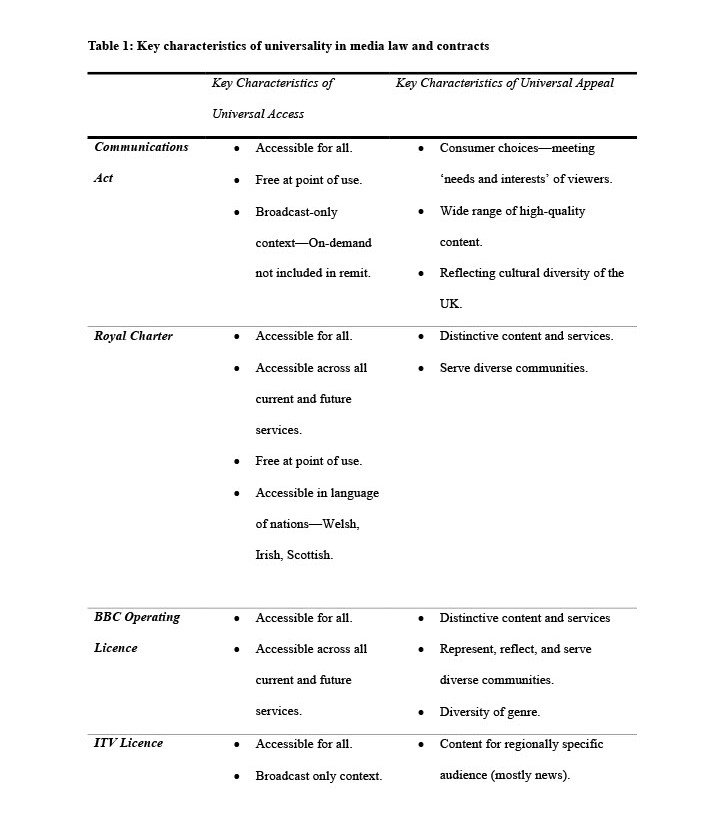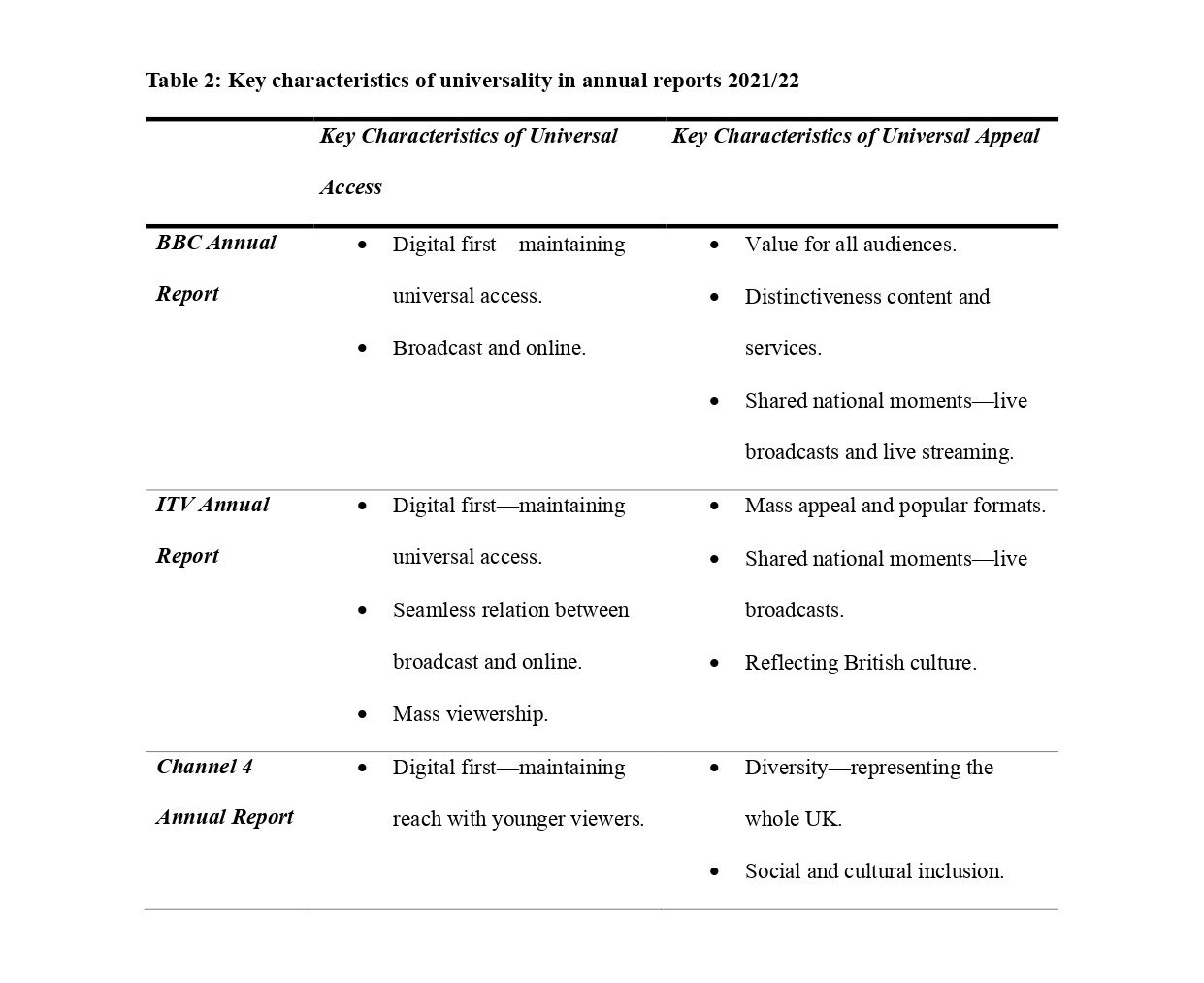| 7 mins read
Universality has long been a central tenet of normative theories of public service media (PSM), encompassing two key principles: universal access and universal appeal. Universal access encompasses geographical universality—available to all regardless of infrastructural costs—and a universality of payment—free at the point of use. Universal appeal is the principle that PSM should provide a wide range of programming that caters for diverse national audiences, reflecting a mission to inform, educate and entertain.
The rise of platforms and streaming in the UK has challenged both.
While even older viewers have increasingly turned to online services, the loss of reach has been particularly severe among 16–34 year-olds who tuned away from broadcast TV in favour of commercial online competitors, like Netflix, YouTube and TikTok. To maintain universal access, PSBs have accelerated their transition to PSM. However, 7 per cent of UK households lack internet access at home. To ensure universal access, therefore, PSBs need to maintain both linear and on-demand services.
Platforms like Amazon, Apple, Google and Facebook have transformed the media market. Each work together to support a business model that thrives on the extraction and manipulation of vast user data, which is turned into tradeable products and services and used to shape user behaviour on- and offline. This gives platforms gatekeeper power (the ability to pick winners and losers), and control over infrastructure that can be used to maintain competitive advantage. The UK's PSBs now serve as content providers (of programmes and VoD services) to the platforms against which they also compete for audiences, legitimacy and (for Channel 4 and ITV) advertising revenue, in a market where the platforms set the terms of engagement.
One side predominantly argues that PSM should only provide ‘certain niche services such as documentaries, investigative journalism and local news’ that are socially and culturally beneficial, but not sufficiently popular and profitable. From this perspective, universal access and appeal are less relevant principles. For those who champion PSM, the shift to online media has raised issues of democracy that justify the universality of PSM more than ever.
What follows are findings of document analysis comprising three categories of policy and regulation focusing on television: media law and contracts, annual reports, and current policy debates. The primary focus is on the three major UK PSBs each representing different models of public service: licence fee funded (BBC), commercial (ITV), and commercial non-profit (Channel 4).
How are UK policy makers redefining the value of universality in the transition from public service broadcasting (PSB) to public service media (PSM)?
Media law and contracts
Media law and broadcast licensing contracts form the constitutional foundation for UK PSM. The Communications Act 2003 and Royal Charter establish the broad remit for PSM, while contracts detail practical requirements for broadcasters to fulfil their remits. However, the interpretation and significance of universality remains vague.
The language of universal appeal is slippery in the media law. It seems fitted to satisfying individual consumer choice rather than fostering a space of collective civic expression. In contrast, universal access is comparatively uncomplicated. However, the Communications Act is an outdated piece of legislation that barely discusses PSM in an online context and its most significant reference to on-demand services is to exclude them from the public service remit of ITV and Channel 4 altogether.

Annual reports
In their 2021/22 annual reports, BBC, ITV and Channel 4 emphasise ‘digital-first’ strategies to ensure universal access and reach all potential audiences (see Table 2 below). Digital-first is seen less as an opportunity for expansion than as a strategy for the maintenance of universal access and appeal. Each report also emphasises the need to remain present on linear broadcast.
These reports reflect a deeper anxiety about the meaning and value of universality that derives from complying with contradictory pressures and a lack of clarity in the media law. The actual definition of universality (particularly universal access) differs; the BBC has a focus on providing ‘value for all audiences’. ITV interprets universality as reaching a mass audience. Finally, Channel 4's annual report associates universal appeal with its core value of diversity.

Policy debates
As in the annual reports, achieving sufficient reach is a key issue in policy debates. Ofcom frames the problem as one of universal relevance. Universal appeal, traditionally seen as wide reach, is now in tension with the idea of personalised connections between services and individual viewers.
Recent policy documents acknowledge this tension, but often frame it as a justification for a diminished role for PSM. For example, the House of Lords’ inquiry into BBC funding recognises that ‘the more that audiences have alternative choices for their media consumption, the less enthusiastic they may be about paying for something that does not reflect them or their needs.’ A recent white paper's disregard of universality is evidence of a wider trend in UK policy making. In a context where PSMs are operating in a crowded market, with declining audiences, the assumption that PSM should be freely accessible to all has become open to debate.
Conclusion
What these policy documents fail to tackle are the structural challenges underpinning the contemporary media market. For example, PSBs are disincentivised from distributing content on platforms that younger audiences use such as YouTube and TikTok because they lack control over the environment within which their content is accessed, do not receive adequate advertising revenue or user data, and audience engagement on these platforms is not routinely measured.
Rather than abandon universality altogether, policy makers should confront these challenges head-on. To do so, however, requires not only a change to PSM policy, but also a need to address wider platform policy.
Current PSM policy treats the transition online as primarily a question of economic survival, prioritising flexibility over the requirement to provide PSM characterised by universal access and appeal. UK media law appears unable, or unwilling, to address head on the fundamental challenges of the platform age.
Need help using Wiley? Click here for help using Wiley


